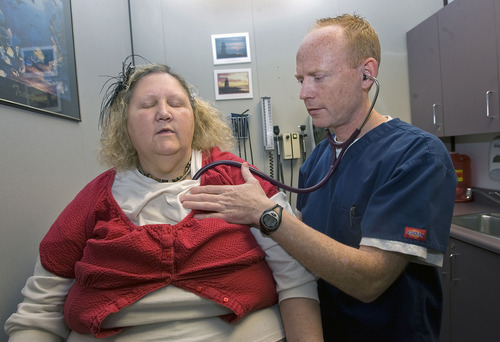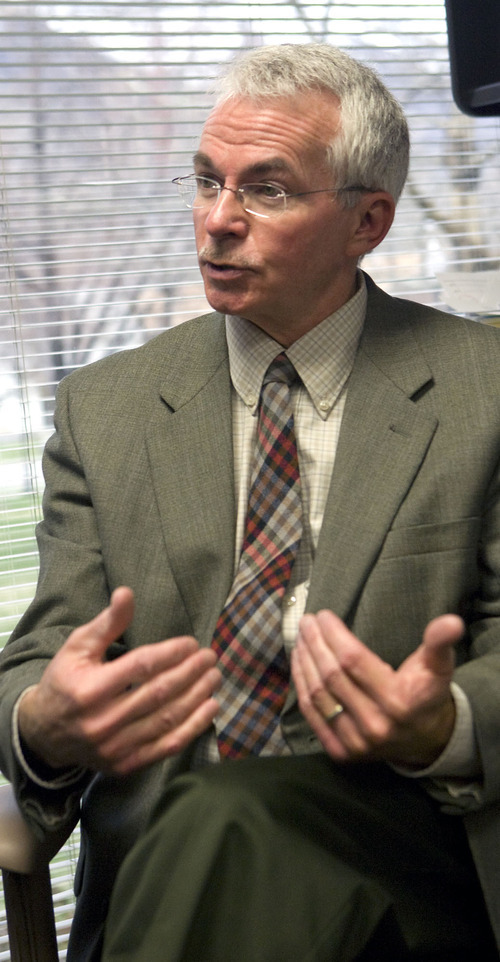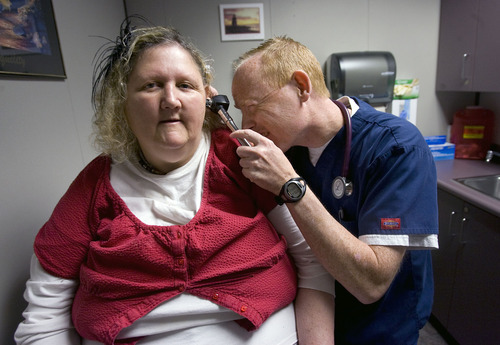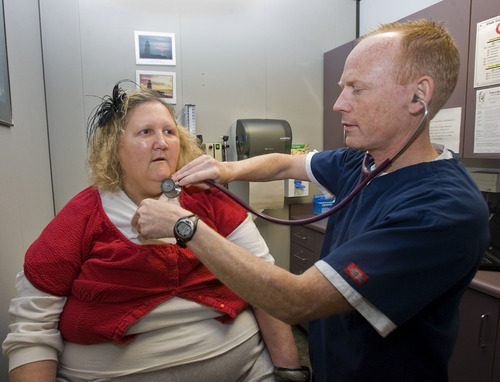This is an archived article that was published on sltrib.com in 2011, and information in the article may be outdated. It is provided only for personal research purposes and may not be reprinted.
Provo • Michelle Huggins vows to boycott doctor visits if she can't go to this city's Health Clinic of Utah for her medical care.
Her loyalty was earned by the caring providers — and a teddy bear. Steve Mickelson, the clinic's family nurse practitioner, promised the 49-year-old a stuffed animal if she stopped drinking sodas.
With the state Legislature mandating the Provo clinic's closure this summer to save money, Huggins, who has bipolar disorder, said she doesn't want to go anywhere else.
"I like this doctor too much," she said Thursday during a visit for shoulder pain. "I don't want to see them closed."
The Legislature singled out the clinic as it looked for $9.8 million in trims from the Utah Department of Health budget during the recently ended legislative session.
Closing the clinic, which is run by the Utah Health Department and provides medical and dental care to patients on Medicaid, will save $146,000.
"If the state couldn't manage to run it like a private office without a subsidy, we probably ought to close it," Sen. Allen Christensen, R-Ogden, said Thursday to explain the cut.
At the same time, lawmakers singled out the Cedar City Community Clinic to receive $49,000. That clinic provides medical, dental and mental health services to about 1,800 people.
Christensen said the allocation was a "favor" to Sen. Dennis Stowell, R-Parowan, who is gravely ill and spent the session undergoing radiation for cancer that has spread to his bones.
"The fact that Sen. Stowell was the one doing the asking, it was a given," Christensen said. "The man is my personal hero."
As for the Provo clinic, Christensen, a pediatric dentist, noted that his office and others treat Medicaid patients and they don't receive the "kickbacks," or subsidy, that the state clinic receives.
Nevertheless, Christensen said Medicaid reimbursement rates are "horrendous" — some providers refuse to see new Medicaid patients because the payments don't cover the cost of the care.
And that's why the health department and the clinic providers are searching for money elsewhere to keep the Provo site open. They fear their patients won't be able to find new doctors and dentists.
"Our patients would suffer," predicts Joseph Miner, the clinic's medical director and the director of the Utah County Health Department.
He said the clinic fills a niche. Many of the patients — 7,300 patient visits were made last year — are like Huggins, chronically mentally ill.
"A lot of them don't fit in very well anywhere else," Miner said. "It's hard to see them try to establish another [medical] home."
As a case manager for Wasatch Mental Health, Karen Schnebly said she recommends that her clients who don't already have a medical doctor go to the Provo clinic.
"It's going to be devastating. We have many, many patients who come here," said Schnebly, who was in the clinic Thursday with Huggins.
Schnebly said she has tried to get her Medicaid patients into other clinics but, "They don't want to see you."
Another complication is the type of Medicaid insurance that some of the Provo clients have. Called Primary Care Network, it's a bare-bones policy that doesn't cover much. Private clinics are even more reluctant to take PCN patients than patients who have full Medicaid coverage. About 12 percent of Provo's medical patients and 18 percent of dental patients are on PCN.
Marc Babitz, who oversees the clinic as director of the health department's Division of Family Health and Preparedness, said he is trying to find a way to keep part of the Provo clinic open.
With the Legislature's blessing, the health department may trim the budgets of the other medical and dental clinics it runs — in Ogden, Salt Lake City and St. George. Those clinics are also subsidized by the state. The total subsidy last fiscal year was $932,725. Provo sees the fewest patients and the subsidy per patient visit is the highest.
"I really don't want to close the whole clinic," Babitz said. "That's an important access point to care."
Several blocks away, the community health clinic Mountainlands Family Health Center is eager to take on the Provo clinic's patients. As a federally qualified clinic that also serves low-income residents, it receives higher reimbursements for Medicaid patients than private clinics do. But federal cuts are also being anticipated.
"To have more Medicaid patients is nothing but great for us," said Mountainlands assistant director Lori Wright, who said it would also accept PCN patients. The wait for new patients can be two weeks, though some are seen within a day, she said.
But Huggins said she won't go to Mountainlands. The clinic was too loud and busy for her. "It's too much for me. I wouldn't go, no way."
Meantime, new patients continue to schedule appointments at the Provo clinic. They travel from hours away, say the staff.
"We had two new patients today, three new patients yesterday," Mickelson said.
Other public health cuts
The Legislature cut the Utah Department of Health's budget by $9.8 million, or 2.7 percent. The cuts include:
$125,000 from the sexually transmitted disease program, nearly eliminating the state's contribution to reducing the rates of STDs. The federal government provides the state about $450,000. The cut ends a program meant to educate Utahns about chlamydia and gonorrhea. It's unclear if the state will retain the web site, http://www.catchtheanswers.net/, that was created as part of the campaign. Provisional data shows that the state's chlamydia rates continue to jump. Almost 6,700 Utahns were diagnosed with the disease last year, up 9 percent.
$247,000 in primary care grants to providers of health services to low-income Utahns. That leaves almost $950,000 in the program. The Legislature said none of that money can go to community health clinics that receive federal money, noting that federal reform anticipates boosting their budgets. But Republicans in Congress want to cut $1.3 billion in health center funding, including $1.5 million in Utah.
$100,000 from the childcare licensing division, meaning there will be less training offered to child care providers and inspectors.
Source: Utah Department of Health, National Association of Community Health Centers









